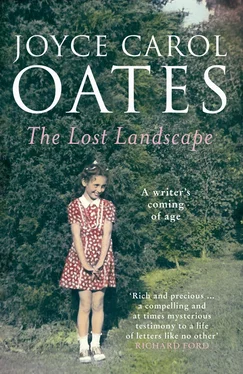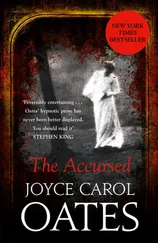Though my father could never afford to own his own plane he remained an avid flier for decades; eventually he would log over two hundred hours of flying time. Indeed, “Fred Oates” was famous in Millersport and environs for his love of flying. Only reluctantly, when his eyesight began to weaken in his late sixties, did he give up flying.
(In the mid-1970s when a West German film crew preparing a documentary on my writing career for public television came to Millersport to interview my parents, the director arranged for my father to fly him and his cameraman over the terrain of my childhood, in a Cessna 182 horsepower single-prop plane. How courageous these Germans were! Or did they not quite comprehend how courageous they were being to entrust their lives to a stranger, Fred Oates, who could claim only a pilot’s license from a rural upstate New York airfield? And how truly bizarre it was for me to see the film footage of my father in the cockpit of the plane flying again over that familiar landscape!)
Many times Daddy has said that for the pilot there is nothing in life on land to quite compare with life in the cockpit, at his instruments, aloft.
IN LATER LIFE, MYfather and mother often visited my husband Raymond Smith and me in Princeton. On these trips they always flew, and sometimes they flew in a small plane to the small Princeton airfield about ten miles from our house.
Though being flown is nothing like flying —(as my father insisted)—these flights were exhilarating to him. Daddy never failed to comment on the pilot’s performance and, if he had the opportunity, he congratulated the pilot on a “good landing.”
Sometimes, when I am alone, and aloft, in my window seat staring out at a sea of clouds, or at land or glittering water far below, I feel a sudden pang of loss—for what, I don’t know.
For Lee’s Airfield, perhaps. For the shining little Piper Cubs and the boys who’d helped to start their propellers. For my beloved father, a young father, with tufted dark hair and a widow’s peak, laughing as he adjusted helmet strap beneath my chin, for I must have looked very silly in my flying gear, as a child. And for my beloved mother, scarcely daring to breathe until the shining little yellow plane returned to the airstrip, and made a “successful” landing.
The long-ago romance of small planes. Daddy as pilot.
But I have only to shut my eyes to see the airfield bumping and jolting outside the windows of the Piper Cub and to feel again how we are being lifted into the air, wind-buffeted but bravely continuing to rise . . .
DO ALL FAMILIES HARBORsecrets? Do all families conspire in secrets, if not cultivate secrets? The family is the social unit that seems to depend crucially upon a clear separation of those who are in power and those who are subordinate; those wielding power are required to know more than those who are subordinate to them, and there almost seems, at times, a kind of taboo in sharing such knowledge. Before you were born is both a neutral designation and a way of shutting a door in your face which you would wish to open at your own risk.
Of course, all that children are not told, children somehow know . Not the words to the song but its melody, and its tone. A writer might be one who, in childhood, learns to search for and decipher clues; one who listens closely at what is said, in an effort to hear what is not being said; one who becomes sensitive to nuance, innuendo, and fleeting facial expressions.
And there are the abrupt silences among adults, when a child comes too near.
IN HIS PREFACE TO What Maisie Knew , Henry James ponders the “close connection of bliss and bale”—the irony of “so strange an alloy, one face of which is somebody’s right and ease, the other somebody’s pain and wrong.” Nowhere is this paradox more true than in the matter of a premature and violent death, for example the murder of my mother’s father which was also, in effect, the murder, as it was the irrevocable dissolution, of a family.
All this happened long before I was born, in 1917. In a Hungarian community in Black Rock, now a part of Buffalo, New York. My mother’s father was in his forties at the time, a Hungarian immigrant from the countryside near Budapest, who worked in a factory in Buffalo; one night, in a tavern in Black Rock, he was killed by another Hungarian immigrant, allegedly “beaten to death with a poker.”
Beyond these blunt bare facts, nothing more seemed to be known. The killer must have been identified, maybe even arrested and charged, and very likely the killing would have been described as “self-defense”—possibly, this was true. All I would ever know of my mother’s father was that he was, like other Hungarian males in the family, an individual of whom it might be said that he was not slow to flare up in anger, if not rage, and that he was a “heavy drinker.” The word peasant is a disallowed word, a shameful usage to contemporary ears, but Hungarian peasants is probably the most objective description of my mother’s relatives who’d immigrated to western New York in the early 1900s. By contemporary standards these immigrants were desperately poor people of the class of those about whom Upton Sinclair wrote so compellingly in The Jungle (1906), set in the Chicago slaughterhouses.
The sudden death of my mother’s father left her family destitute. Her parents had had eight children, the older of whom were already working. (Recall that this is 1917, when immigrant children rarely went to school but worked in factories, mills, and slaughterhouses, for wages much less than those of adult men.) My biological grandmother, whom I would never meet, nor even see a photo of, gave away at least one of her children at this time, the youngest, my mother, who was nine months old.
The infant was given to the couple whom I would know as Grandma and Grandpa Bush—Lena and John Bush. (“Bush” was the name the immigrant couple had been given at Ellis Island, as it is an approximation of their Hungarian name “Bus.”) One day it would be told to me, or suggested, in the casual way in which such genealogical information was likely to be provided, that John Bush may have been a brother of my mother’s deceased father—in which case, my mother had been sent to live with an uncle and his wife, which does not seem quite so desperate as being given away to strangers. There were no “adoptions” in those days—at least, no government agencies that were concerned with the fate of immigrant children of whom, in heavily Roman Catholic communities like Black Rock, there were many. My mother was taken in by a couple who not only wanted a child, but also needed another farm-helper in their household; as soon as she was old enough, she was given farm chores; for a few years she attended a one-room schoolhouse a mile away from the small farm in Millersport, across Tonawanda Creek in Niagara County—the very one-room schoolhouse I would attend years later.
Briefly too my mother attended a Roman Catholic school taught by nuns, in Swormville, from which she graduated after eight grades, at which time her education ceased. Eight grades were considered more than sufficient at this time in our history, in rural communities especially, where the designation “high school graduate” was a matter of pride.
When my mother Carolina Bush was eighteen or nineteen years old, and working part-time as a waitress in a restaurant on the Millersport Highway, she and my father Frederic Oates met. This would have been 1935 or 1936. Fred Oates was three years older than Carolina; he’d been born in Lockport, a small city seven miles north of Millersport, on the Erie Canal. Like my mother’s early life, my father’s early life had been shaped by the premature and violent death of a relative, in this case his maternal grandfather, a German Jewish immigrant who’d tried to kill both his wife and his fourteen-year-old daughter (my grandmother-to-be) with a shotgun, and ended up killing only himself. My father, too, had had to quit school young, and began work in a “machine-shop” (Harrison Radiator) in Lockport. He would work at Harrison’s for an astounding forty years before retiring, though by degrees he was to be promoted from the assembly-line machine shop to tool and die design.
Читать дальше












